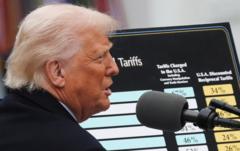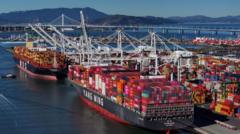On the final day of his overseas tenure, President Biden showcased the Lobito Corridor in Angola, asserting U.S. commitment to Africa amid competing global interests, including China’s rising influence.
**Biden Celebrates Africa's Future Through Angola Train Project**

**Biden Celebrates Africa's Future Through Angola Train Project**
In a bid to strengthen U.S. ties with Africa, President Biden tours a crucial railway designed to advance economic integration and resource transport.
The railway, 800 miles long, is pivotal for transporting critical minerals and enhancing U.S. supply chains. This venture symbolizes a strategic push to deepen economic ties and investment while providing easier access to vital resources for America's future.
In his last scheduled overseas trip as President, Joe Biden highlighted a significant infrastructure initiative in Angola, aiming to bolster U.S. economic presence in Africa. The Lobito Corridor, an 800-mile railway project supported with U.S. funding, is designed to link Angola with the Democratic Republic of Congo and facilitate export of critical minerals crucial for various technologies, including electric vehicles and smartphones.
During a roundtable discussion in Lobito with Angolan President João Lourenço and other African leaders, Biden emphasized the ambition behind this venture. “I’m coming back to ride on the train from end to end,” he stated, underscoring the project's importance. He characterized it not just as a railway but as a pathway leading to enhanced economic future for the region.
The Lobito Corridor is conceived as a response to concerns that the United States has overlooked African interests, enabling China to emerge as a dominant economic force on the continent. By investing in projects like this railway and promoting economic connectivity, the Biden administration aims to reaffirm U.S. participation and commitment to Africa's growth and development.
Once operational, the corridor is expected to simplify the shipping of minerals such as copper and cobalt to the U.S., ultimately aiding in the diversification of supply chains critical for American industries. This initiative represents an intersection of geopolitical strategy and economic necessity, as the U.S. aims to strengthen its foothold in resource-rich regions while countering China's expanding influence.
In his last scheduled overseas trip as President, Joe Biden highlighted a significant infrastructure initiative in Angola, aiming to bolster U.S. economic presence in Africa. The Lobito Corridor, an 800-mile railway project supported with U.S. funding, is designed to link Angola with the Democratic Republic of Congo and facilitate export of critical minerals crucial for various technologies, including electric vehicles and smartphones.
During a roundtable discussion in Lobito with Angolan President João Lourenço and other African leaders, Biden emphasized the ambition behind this venture. “I’m coming back to ride on the train from end to end,” he stated, underscoring the project's importance. He characterized it not just as a railway but as a pathway leading to enhanced economic future for the region.
The Lobito Corridor is conceived as a response to concerns that the United States has overlooked African interests, enabling China to emerge as a dominant economic force on the continent. By investing in projects like this railway and promoting economic connectivity, the Biden administration aims to reaffirm U.S. participation and commitment to Africa's growth and development.
Once operational, the corridor is expected to simplify the shipping of minerals such as copper and cobalt to the U.S., ultimately aiding in the diversification of supply chains critical for American industries. This initiative represents an intersection of geopolitical strategy and economic necessity, as the U.S. aims to strengthen its foothold in resource-rich regions while countering China's expanding influence.




















